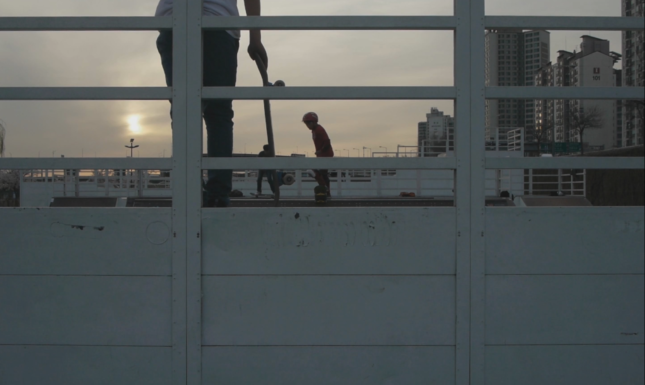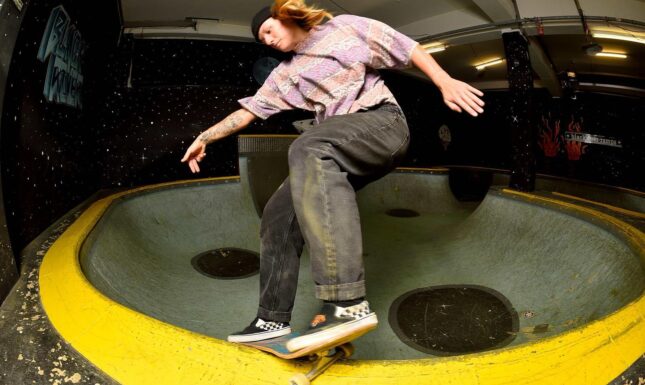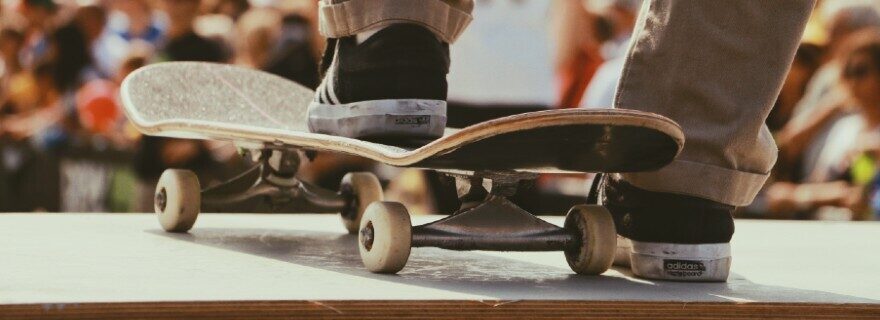We need to talk about skateboarding
Skateboarding is a skilful practice, a discipline of failure, and a global culture. Sander Hölsgens studies skateboarding as a tool for social good and reflects on three socio-political interventions by skaters in the Netherlands.
Professional skateboarders Louisa Menke and Candy Jacobs have been advocating for gender equity for decades. Organisations and collectives such as Women Skate the World, Rollende Mina’s and New Wave build skate communities that are welcoming to all. And the Rotterdam-based foundation Skate48 continues to encourage municipalities to keep public spaces skate-friendly.
Let’s talk about some of the other engaged projects skaters in the Netherlands have been up to. In this blogpost I will discuss three initiatives doing their part to care for the spaces we inhabit.
We are not a playground
In 2020, photographer Erik Kessels launched his photo exhibition ‘Destroy my face’ at BredaPhoto. The work consisted of images of people who have undergone plastic surgery. Kessels used machine learning and related artificial interventions to generate these images of, primarily, women.
Its location? Skatepark Pier 15 in Breda. Stronger yet, the entire park was covered with sixty images: from skate obstacles to the flat ground, there was no way around it. That was the point, as Kessels puts it: “The deformation that once started with plastic surgery will continue in this installation while skaters create another uncontrolled reality.”
Skaters, myself included, were shocked. Not only did the exhibition perpetuate the stigmatisation of surgical interventions, it also exploited skaters in substantial ways. Skating at Pier 15 would mean that you’d partake in “deforming” human faces. Without their permission, skaters were harnessed to reproduce an act of violence.
A collective of skaters, called We are not a playground, wrote an open letter to BredaPhoto and Pier 15. Signed by over two thousand skaters, artists, curators, and academics, the letter eventually led to apologies by the skatepark and the removal of the exhibition.
Above all, the open letter foregrounds how there’s an ever-growing increase of skaters demanding equitable and welcoming spaces.


Save Museumpark
Rotterdam has a decades-long history of skateboarding: RSI skateshop has been around since 1978, Gerard Bakx was one of the first professional skaters in the Netherlands, and in 2009 local skater Tim Zom won the prestigious Vans Grandprix at Blaak.
The municipality claims to ‘stimulate’ skateboarding, yet this is not to say that it’s accommodating a multiplicity of uses of public space. Prompted by the Boijmans Museum, the city announced that the Museumpark (a public space in close proximity to the Boijmans, Kunsthal, Het Nieuwe Instituut, and Natuurhistorisch Museum) would be fully redesigned. The aim is to create urban green space that would positively impact public health and the liveability of the city, designed by London-based landscape architects Gustafson Porter.
The issue: skaters (alongside practitioners of other urban arts) have been using and taking care of a substantial part of this park for years and are now being pushed out in favour of tourists, cyclists, and museum visitors – despite promises of the municipality that the space would remain skateable.
While skaters at Museumpark welcome greener sceneries, there’s no other public space with architectural characteristics as accommodating to skateboarding: its flat ground is smooth, the park is spacious and inviting, and it’s possible to bring your own DIY obstacles.
In 2021, skaters (joined by roller bladers, bootcampers, and breakdancers) got together to start a petition, Save Museumpark. One of the principal aims of the petition was to preserve the future of the park and to make visible who are affected by large-scale such projects. In other words, their point was not just to try and save the park for skaters, but also to address forms of systemic inequality that are the result of gentrification.
As Kim Butter, one of the petition’s initiators said during the most recent Stadmakerscongres, “A pattern I notice is that (...) it’s impossible to name at whose expense this is, who is being disadvantaged. If you initiate big projects in [Rotterdam] West or Zuid, or at the Museumpark, then I think it’s important to also name who you might harm (...) And of course that makes you think of working class people, who might live in social housing… why aren’t they addressed?”

Consent is Rad
To be fair, Consent is Rad didn’t start in the Netherlands. Launched in Malmö, it’s “an internationally collaborative project focused on education and sharing the message about the importance of consent in your/our skate scenes.” Aimed at breaking the cycle of sexual violence, Consent is Rad binds collectives, including We Skate Queensland, and is facilitated by sociologist Indigo Willing.
During its launch at the skate conference Pushing Boarders, dozens of panelists and attendees took photos with a sign saying ‘Consent is Rad’. From there, the project has led to accessible resources and publications about consent, tailored to skaters; campaigns in some of the most influential skate magazines, including Thrasher and Free Skate; and most recently a collaborative zine for Sexual Assault Awareness Month.
Consent is Rad collaborates with a myriad of local skate communities across the globe. It features prominently in progressive skate initiatives in the Netherlands, too. New Wave, for instance, started off as a Women Skate the World project to organise skate sessions for queer people and womxn. In March 2022, WORM Rotterdam hosted a New Wave panel discussion on gender identity in skateboarding. On 30 April, skatepark Waalhalla in Nijmegen hosted a skate festival, organised by New Wave and Rollende Mina’s. And around the same time, de Rollende Mina’s ran a workshop dedicated to consent. At these events, and in close collaboration with Consent is Rad, there’s a continuous effort to normalise consent.
These interventions are indicative of the kind of culture skateboarding in the Netherlands is becoming. While Dutch skateboarding has a long way to go, skate collectives and organisations like these are pushing hard to effect positive social change – in skating and beyond.



0 Comments
Add a comment